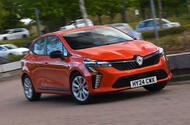Renault’s Fleet Push Raises Concerns of Profit Erosion

The Shift to Fleet Sales Worries Investors
The Renault Group, known for its popularity among private car buyers, is causing concern among investors with its recent announcement to focus more on fleet sales. Investors fear that this shift may result in deep discounting and lower profits.
Private Sales vs. Fleet Sales
Private sales typically generate higher value compared to sales to businesses, as businesses often negotiate for lower prices based on the promise of larger orders. Renault’s expertise in smaller, cheaper internal combustion engine (ICE) cars aligns better with the needs of private customers. However, the company’s move towards larger models and the growing demand for tax-friendly hybrids have prompted a shift towards targeting fleets.
Investor Concerns
Investors have been generally supportive of Renault’s transformation under CEO Luca de Meo, particularly its ability to maintain high pricing. However, they worry that the shift towards fleet sales may lead to significant margin deterioration. Tim Rokossa, head of research for Deutsche Bank, expressed this concern in a note, stating that fleet sales typically have lower margins.
Renault’s Sales Composition
Despite the shift towards fleet sales, the Renault Group remains primarily a retail business in Europe, with 62% of its sales coming from private customers, compared to the industry average of 40%. Dacia, a brand under the Renault Group, boasts the highest retail share in the industry at 80%, with the Sandero being Europe’s most popular retail car. Renault’s sales are evenly split between retail and fleet, according to company figures.
Fleet Sales Strategy
Renault believes that fleet sales can still be profitable without resorting to deep discounting. CEO Luca de Meo stated during the company’s second-quarter earnings call that they can define the conditions for fleet sales themselves and avoid discounting cars. De Meo’s strategy since joining the company in 2020 has been to expand into bigger and more profitable segments. The introduction of SUV models like the Symbioz, Rafale, Espace, and electric Scenic aligns with this strategy.
Renault’s Performance in the UK
In the UK, the compact Clio and Captur models accounted for two-thirds of Renault’s sales in the first seven months of 2024. Despite the emphasis on small cars, Renault has been shifting towards fleet sales in the UK, which is the company’s sixth largest market globally. Fleet sales accounted for 61% of Renault’s 32,219 sales in the UK during this period, surpassing the European average of 38%. Dacia’s sales in the UK were more skewed towards retail at 37% fleet sales, still higher than the 20% European average for the brand.
Challenges and Opportunities
Renault, like many volume car makers in the UK, faces the challenge of attracting customers with reduced disposable income while striving to improve margins and prove to investors that it can extract more profit from each car sold. Competitors such as MG and Chery, who aggressively pursue market share, further intensify the competition. Renault will need to increase fleet sales to rebuild its falling electric vehicle (EV) market share, as EVs are financially viable with incentives offered to company car buyers. However, the company must ensure that these sales do not involve excessive discounting.

